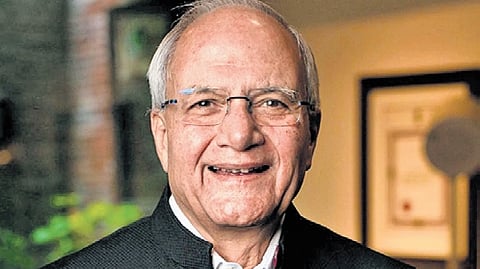

THIRUVANANTHAPURAM: Kerala must revise its strategy amid concerns over the adverse impact of artificial intelligence (AI) on jobs, says Ajai Chowdhry, co-founder of HCL, who is commonly referred to as the ‘Father of Indian Hardware’.
The state should shift its focus from software services to electronic product design, he tells TNIE in a freewheeling conversation. Chowdhry, who now serves as chairman MGB of the National Quantum Mission (NQM) and chairman of EPIC Foundation, was in the city to attend Huddle Global 2024. Excerpts from the interview:
Do you follow the industrial ecosystem in Kerala? Does the state have a bright future in quantum technology?
Kerala has a rich tradition in electronics. Quantum is a very new area, which is made easier if you have a good background in electronics. This is an ideal time for Kerala to make headway. NQM focuses on four areas – quantum computing and simulations, quantum communications, quantum sensing and metrology, and quantum materials and devices.
Among the four verticals, which is the most important?
We believe that all are equally important. At this moment, quantum computing is in its nascent stage. Therefore, we need to work on all four. In computing, we developed the first 6-qubit computer at the Tata Institute of Fundamental Research. A startup is working on a 20-qubit computer. Things are happening.
What are the immediate goals of NQM?
Our aim is to develop a 1,000-qubit computer in eight years. Another is to achieve quantum communication over 2,500km, using satellite and fibre.
What are NQM’s activities for a quantum-secure India?
China is far ahead in quantum, even ahead of the US. This is a potential risk. Our banks and financial systems, electrical grids, government, etc., cannot be left vulnerable. It is very crucial for India to become quantum secure. We are preparing our recommendations for the same. The report will be submitted to the government shortly.
Kerala is a pioneer in electronic hardware manufacturing. State-owned Keltron was established four decades ago. What is the way ahead for the state?
You were very early movers in electronics. The Maker Village in Kochi was a bold step. Today, every state is promoting the services sector. But the software services business is set to face headwinds because of AI and automation.
Job loss due to AI is an emerging concern. A large number of Keralites work in the software sector within the state and outside. How can we mitigate the risk?
AI and automation will create headwinds for services. Programming and call centre jobs are on the way out. Kerala’s USP is brain power. Why not focus on what you are good at? The Maker Village is a good start. Set up similar villages to design products at multiple locations, linked to good educational institutions. There should be proper strategy and each village should focus on specific hardware.
Do they require large-scale funding?
Unlike fabs, product design doesn’t need large investment. You need to empower startups and companies to design and make products both systems and chips. I’m a member of the taskforce set up by theUnion government to fund startups and companies designing chips and product development. It will be a Rs 30,000-crore project. We have identified about 45products and about 29 chip products. The government will provide 50% funding. Kerala is capable of creating a product ecosystem. You have had a terrific start.
What about the market?
We have suggested an interesting strategy to the government. Government is the largest buyer and it should give business to Indian companies. This is a successful model followed by China and the US.
We have a great opportunity when Donald Trump assumes office. Trump is set to impose a 60% duty on Chinese products while it would be 20% for other countries. So,India will have a 40% points advantage over China. He has announced significant tariff hikes for Vietnam and Mexico as well. I feel the gates are opening for India in the products business.